
Last Updated Sept. 26, 2025
January 1970
New music releases: Bridge Over Troubled Water - Simon & Garfunkel; Moondance - Van Morrison; Barbra Streisand's Greatest Hits - Barbra Streisand; "Bridge Over Troubled Water" - Simon & Garfunkel
On the day after New Year's, Keith spends the day with his old band The Beachcombers, then takes them out to the Speakeasy. They find it difficult to keep up with their high-living former drummer.
On the 3rd, Melody Maker has the article "Who in row over those 'late' concerts." They report that John and Tony Smith were refused permission for a Who concert at Glasgow's Kelvin Hall for March 22nd because the hall management had heard bad things about The Who from the Palace Theatre, Manchester and The Hippodrome, Bristol.

On the 4th, Keith travels to Hatfield to preside over the opening of a disco at the Cranbourne Rooms adjoining the Red Lion pub. Accompanying him is his wife Kim, his friend and drummer for the Bonzo band "Legs" Larry Smith and Smith's girlfriend, all driven by Keith's chauffeur Neil Boland. A group of skinheads also show up at the disco. After Keith and his friends leave and get in Keith's Bentley, the skinheads attack the car, surrounding it and throwing pennies and stones. Boland gets out, trying to clear a path and is quickly set upon by the crowd. Keith, in a panic, scoots under the wheel to try to get them out of danger and stomps on the gas propelling the car forward while Smith tries to steer from the backseat since Keith cannot drive. The car travels 100 yards down the road to another social club where they stop to get help. When Keith gets out, a van driver tells him someone is under the car. Keith looks. It is Boland, pinned under the car, his head crushed. The next morning is a field day for the tabloid press as they spread the story of the rich, drunken rock star who ran over his chauffeur.
Plans for the Who to go in studio and record this week are cancelled due to Boland's death. Instead, on the 6th, Damon Lyon-Shaw at IBC Studio A, London, mixes a preliminary Who live album from Bob Pridden's two-track tapes recorded during the 1969 U.S. tour. The tracks are "Young Man Blues version 1," "I Can't Explain," "Fortune Teller," "Young Man Blues version 2," "Summertime Blues" and "Shakin' All Over."
On the 9th, the first inquest into the death of Neil Boland is held, but is immediately adjourned, postponed until February 20th. Keith knows it is not his fault but takes it to heart anyway, brooding on his role in Boland's death for years after.
Also on the 9th, "Legs" Larry Smith, as "Topo D. Bil," releases the single "Witchi Tai To" in the U.K. Keith is a guest percussionist on the track.
Pete is interviewed by Chris Welch in the Melody Maker of the 10th. He discusses the future of Tommy and his plans to produce an album by a group formed around his old art school friend Andy Newman.

Having begun the "opera house" tour at the London Coliseum in December, The Who take their new opera to the Theatre des Champs Elysses in Paris on the 16th and 17th, the first rock act allowed to perform in this home for French opera. The second night is broadcast live on Europe 1 as part of a Musicorama special.

Rolling Stone, in their year in review rate Tommy the most overrated album of the year, "four sides of music that would have made a great single album."
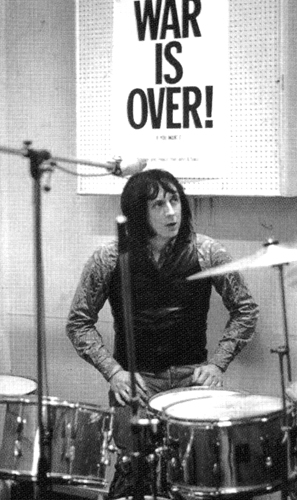
Before the next leg of the tour, The Who jet back to IBC Studios in London on the 19th to record their first post-Tommy record "The Seeker." Pete plays guitar, piano and produces as Kit Lambert is unavailable due to recent dental surgery. Damon Lyon-Shaw engineers the session.
On the 24th, The Who play Tommy at Der Kunglige Teater in Copenhagen. Due to the bitter cold in Copenhagen on this date, Pete introduces the opera as "Tommy on Ice!" Leading members of the Danish government take the first two rows for themselves but walkout halfway through. Despite the highbrow attention, The Who find no room at the inn as their reservations at the Copenhagen Inn are turned down due to a hotel policy against "long-haired pop groups."
Also on the 24th, Melody Maker reports that The Who are expected to be the subject of a documentary for European television to be made by Granada's Jo Durden-Smith. Also reported in this issue is The Royal Albert Hall's refusal to be the site of a benefit concert for "Release" and the National Council for Civil Liberties. The concert was to have featured John Lennon, The Who, The Incredible String Band and King Crimson.
And in Billboard of the 24th, a new single by "Jennifer", a cover of "See Me Feel Me" and "Listening to You" under the title "We're Not Gonna Take It", is released on Parrot. Jennifer is Jennifer Warnes, later to famously duet with Joe Cocker on "Up Where We Belong". As far as I know, this is the first cover of a Who song sung by a woman to be released.
On the 26th, The Who perform at the Stadt Opera House in Cologne, West Germany. German President Heinemann and Chancellor Willie Brandt attend the show. The German government also declares The Who a cultural attraction meaning that their receipts will not be subject to taxation. The Who donate their $2500 salary to the Save the Children Fund. The Who play there again the next night, and then travel to the Deutschland Stadt Opera House in Berlin on the 28th.

On the 30th, The Who return for another Tommy performance at the Concertgebouw in Amsterdam, The Netherlands. Backstage, Pete writes the song "I Don't Even Know Myself", an attack on rock writers analyzing his personality through his songs.
February 1970
New music releases: Sweet Baby James - James Taylor; Hey Jude - The Beatles; "ABC" - The Jackson 5; Morrison Hotel - The Doors
On the 10th, The Who record and mix the second song written entirely by Roger, "Here For More," at IBC Studio B in London for release as the B-side of "The Seeker."
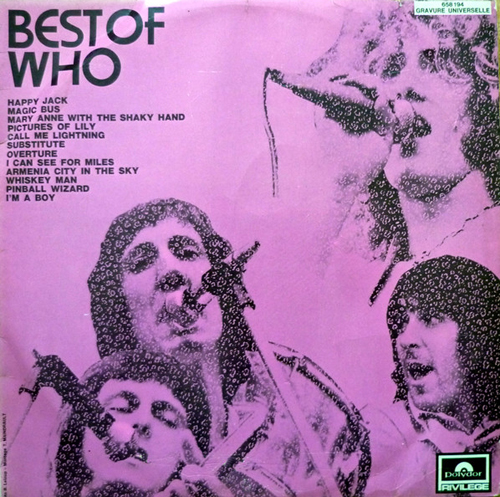
On the 14th, Cash Box reports that Polydor France has announced the release of a new LP, Best of Who. A second volume follows.

Having given up pouring through all the concert tapes recorded during the 1969 North America tour to create a live LP, Pete has two concerts booked for The Who at the Universities of Leeds and Hull. Leeds is held first on Valentine's Day at a student refectory that seats only 2000. The entire concert is recorded although a loose cable creates a "crackling" noise. The Who are in top form, however, giving a particularly great performance. A small bit of the concert is shot on 16mm by a student. In 2007, the film is linked up with the audio and some of it is released on the Amazing Journey: The Story of The Who DVD.
The next night at Hull University features another great performance. This time there is no crackling but a quick listen to the beginning of the tape convinces Pete that the bass guitar was not recorded. The absence is later found to affect only the first four songs and the entire performance is released in 2010.
On the 20th, an inquest is held into the previous month's death of Keith Moon's chauffeur Neil Boland under the wheels of a car driven by Keith. The jury takes ten minutes to declare the death "accidental" and release Keith from culpability. The verdict pleases neither Boland's parents or the police, the latter wanting to bring charges against Keith for being drunk behind the wheel.
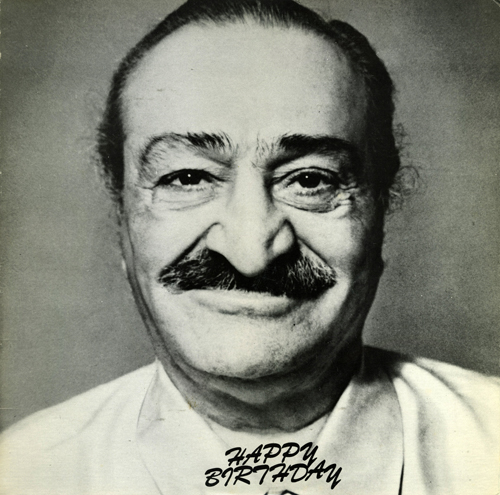
On the 25th, The Universal Spiritual League releases an album dedicated to Meher Baba called Happy Birthday. It is produced by Pete and features six Pete solo tracks including the demo for "The Seeker."
March 1970
New music releases: Déjà Vu - Crosby, Stills, Nash & Young; "Let It Be" - The Beatles; Band of Gypsies - Jimi Hendrix; Bitches Brew - Miles Davis
On the 1st, The Sunday Telegraph carries an editorial by Pete called "Sterility of Drug Taking." Pete praises the work of Dr. Allan Cohen who helps young people get off drugs and says that his own Meher Baba inspired spiritual quest has also led him to reject drug use, a very controversial position for anyone connected to youth culture at this time.
On the 8th, The New York Times publishes an advance review of Live at Leeds by Nik Cohn in which he calls it "...the definitive hard-rock holocaust. It is the best live rock album ever made."

During the month, The Who begin recording new material at Eel Pie Sound, a studio Pete built in the garage next to his Twickenham home. In addition to engineering and playing guitar, Pete also plays electric piano, organ and percussion. John doubles up on bass guitar and brass. Recording will continue sporadically through May and will include early versions of "Postcard," "Now I'm A Farmer," "Naked Eye," "Water," and "I Don't Even Know Myself."
Pete's friend Richard Stanley shoots a promo film for "The Seeker." Who manager Kit Lambert does not like the result but it is still used to promote the single on European television and theatrically in U.S. art cinemas.

On the 19th, The Who tape their mimed performance to a new recording of "The Seeker" for Top Of The Pops at BBC Television Centre, London. This version is later released on the Best Buy bonus disc of BBC Sessions. John said he forced a re-shoot after the director did not include a shot of him in the first take.
While The Who are at the BBC, Pete has a meeting with Radio 1 Controller Douglas Muggeridge who wants more groups to record special tracks for the BBC. Pete agrees to have The Who participate as long as they can record them in their own studio instead of using the BBC's.
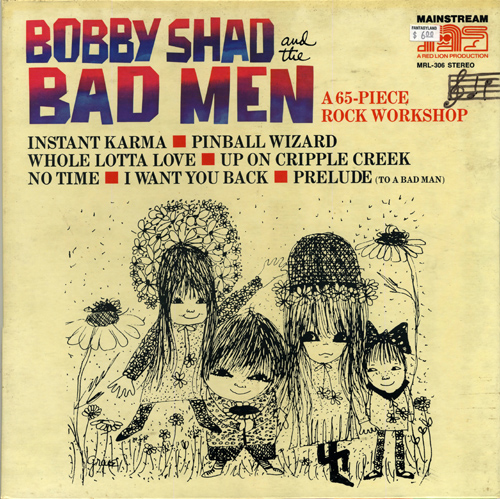
Also on the 19th, Bobby Shad and the Bad Men release their album A 65-Piece Rock Workshop featuring a cover of "Pinball Wizard".

On the 20th, "The Seeker" backed with "Here for More" is released in Britain and reaches #19 in the charts. Derek Johnson in New Musical Express says, "The sound here is as heavy as you could wish for, but blended with the most artistic and delightful musicianship." The Beatles, mentioned in the lyrics, break up three weeks later.

On the 23rd, at Hatfield Magistrates Court, Keith pleads guilty but with extenuating circumstances to the charges of driving with excess alcohol, without insurance and without a driving license on the night of his chauffeur Neil Boland's death two months before. The magistrates dismiss all the charges.

On the 26th, the documentary movie Woodstock, featuring The Who's performance of "See Me Feel Me," premiers at the Trans-Lux Theater in New York and the Fox-Wilshire in Hollywood. The worldwide success of the movie again propels the Tommy album into the charts.
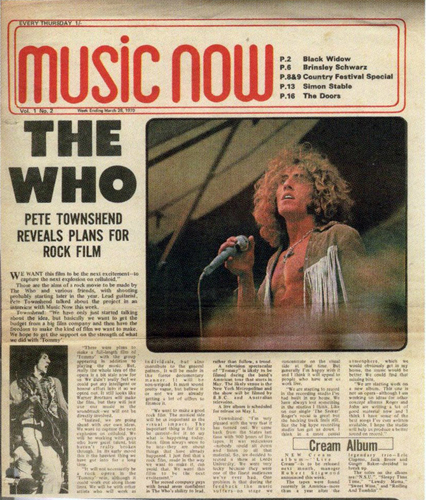
On the 28th, Music Now prints an interview with Pete about the upcoming Who movie plans. He says Warner Brothers is currently interested in making a Tommy movie but, except for using The Who's recordings, The Who will have nothing to do with it. Instead he says The Who is interested in making a "non-scripted" movie. "We will be with other artists who will work as individuals, but also contribute to the general pattern." This is probably referring to Pete's friends, the Tattooist Film Group, who are currently working on several rock film ideas.
April 1970
New music releases: "Up Around the Bend" - Creedence Clearwater Revival; McCartney - Paul McCartney; "Cecilia" - Simon & Garfunkel; Ladies of the Canyon - Joni Mitchell
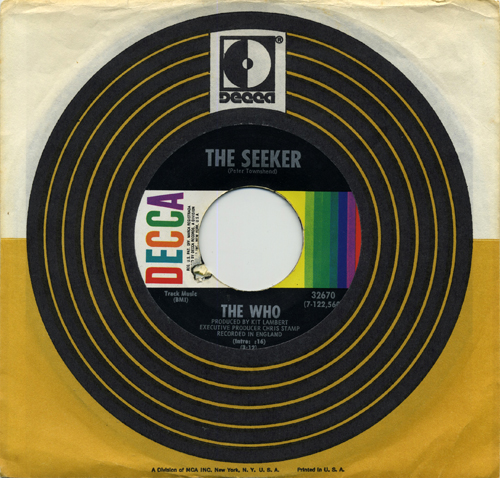
On the 11th, "The Seeker" backed with "Here for More" appears on the U.S. charts. It ultimately reaches #44 in Billboard and #30 in Cash Box. The new Who single receives a lukewarm review from John Mendelsohn in Rolling Stone.

On the 12th, Keith drums as a special guest for a Screaming Lord Sutch gig at the Country Club in Hampstead. Keith is accompanied by the screaming Lord's longtime drummer, Carlo Little, who was also the mentor who first schooled Keith on drums. Teacher and student pound along to "Jenny Jenny" and "Good Golly Miss Molly." The event is recorded and released in 1972.

On the 13th, The Who go into IBC Studios, London to record new studio versions of their stage act for later broadcast on the BBC. Paul Williams is the producer. The tracks are "Heaven and Hell", "Substitute", "Pinball Wizard," "Shakin' All Over/Spoonful," "I'm Free" and "The Seeker". It is the last time The Who record tracks specifically for airing on the BBC. Radio fans first hear them on BBC1's Dave Lee Travis Show of the 19th. "Heaven and Hell" later serves as the basis for the track on the b-side of "Summertime Blues" and four of them are officially released in 2000 on BBC Sessions.
On the 18th, another interview with Pete appears in New Musical Express. That same day The Who perform at Leicester University with supporting act Viv Stanshall's Big Grunt. The show is cut short after Hell's Angels start attacking members of the audience. This lingering taste of Altamont ends when one of the Angels hits Pete in the head with a bottle of Newcastle Brown and he leaves the stage bleeding. Eight stitches put him right.
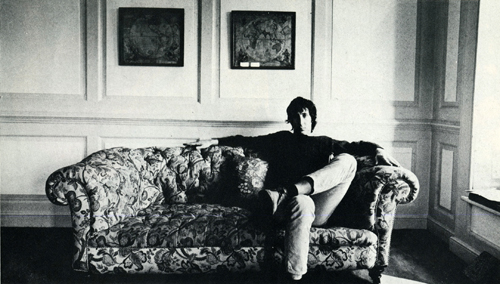
Rolling Stone prints a lengthy interview with Pete conducted by Jonathan Cott. Pete discusses everything from the death of Brian Jones and his writing of the never-released song "A Normal Day for Brian" to his hatred of Woodstock. One of the things he mentions is his desire to make a movie with The Who, "a film which is the equivalent of a rock song, only lasting an hour or longer."
On the 25th is yet another interview with Pete, this time conducted by Penny Valentine in Disc and Music Echo. He says Tommy has provided The Who with fans "...I'd be pleased to lose again, especially the American psuedo-intellectuals who kept reading things into it." That night The Who play an intimate gig for 800 at Nottingham University. Two days later they perform at the Civic Hall in Dunstable with support from Writing on the Wall & Turner.
May 1970
New music releases: Let It Be - The Beatles; Live At Leeds - The Who; Woodstock: Music from the Original Soundtrack and More - Various Artists; The Best of Peter, Paul, and Mary: Ten Years Together - Peter, Paul & Mary
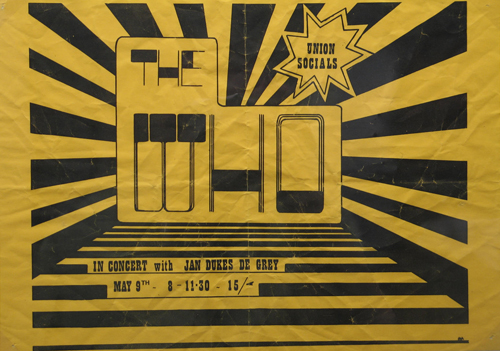
The Who's British University tour continues with performances at the University Great Hall in Exeter before 1800 fans (1st - supporting act Mighty Baby), Sheffield University (2nd), Elliot College at the University of Kent (8th - supporting act Genesis) and Manchester University, a sell-out of 1200 seats (9th).
Starting on the 11th, The Who spend five days rehearsing afternoons at the Granada Theatre in Wandsworth in order to inject some of the new songs they have been recording, such as "I Don't Even Know Myself" and "Water", into the act.

On the 14th, Down Beat carries an interview with Pete in which he discusses his love of The James Gang and declares that the best rock music is neither revolutionary nor political.
On the 15th, The Who have a chance to try out the new songs in concert at Lancaster University. Quintessence, Hammer, and Pink Custard are the opening acts.

Also on the 15th, Nippon Grammophon in Japan releases paired LP's in a metal can. One of the first is Battle of The Who & Jimi Hendrix that will become a sought-after collector's item.

On the 16th Live At Leeds is released in the U.S. and on the 23rd in the U.K. The record comes in a sleeve made to resemble a bootleg and with copies of Who documents, photos and a poster inside. The reviews are ecstatic with the exception of Creem Magazine that faults it for being only one disc instead of two and for not being able to see The Who perform while you play the record. The record reaches #4 in the U.S. charts and #3 in the U.K. Live at Leeds also stays in the British Top Sixty for 21 weeks, the longest for any Who album.

Also on the 16th, the soundtrack of the movie Woodstock is released as a 3-LP set. The Who's performance of "See Me Feel Me" is included. The album will reach #1 for four weeks in the U.S. charts.
On the same day, Melody Maker prints Roger's "Blind Date" reactions to newly released singles. The Who perform that night at Derwent College at the University Of York, with opening act Jan Dukes De Grey.
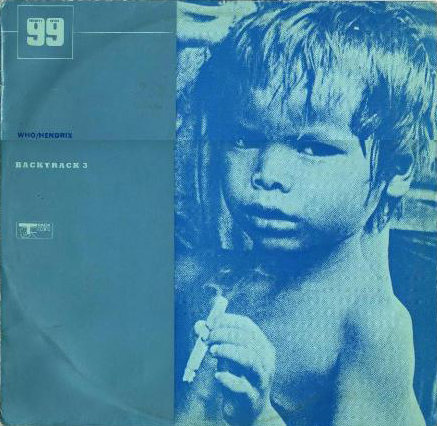
In the U.K. on the 23rd, Track Records releases five LP's at 99p each called Backtrack that feature a variety of old Who material mixed with other Track acts. Backtrack 3 will contain the first true stereo mixes of "Disguises", "Run Run Run" and "I'm a Boy" released in the U.K.

On the same day New Musical Express, which has a cover advertisement for Live At Leeds, carries a picture of Pete, Graham Nash and Tiny Tim singing together for the residents of a handicapped children's home in Britain.

John meanwhile is interviewed in Record Mirror where he says The Who have completed two of a planned ten tracks for their forthcoming album that will have "no main theme about it as Tommy did."
On the 25th, more of the Who's BBC recordings of April 13th are played on BBC Radio One's The Johnnie Walker Show and The Dave Symonds Show.
Also on the 25th, at 7am, the doors of the Fillmore East open to sell tickets to The Who's performance of Tommy at the Metropolitan Opera house. Tickets for both shows sell out in two hours with many of those to people who had waited two days in line.

On the 30th, an interview with Roger appears in New Musical Express. Roger calls the way Tommy has taken over their live set "a bit of a monkey." He says the upcoming shows at New York's Metropolitan Opera will be the last live performances of the rock opera.
Also during the month, Roger finally receives his final divorce decree from his first wife, Jacqueline.
June 1970
New music releases: Closer To Home - Grand Funk Railroad; "Lola" - The Kinks; "Signed, Sealed, Delivered (I'm Yours)" - Stevie Wonder; On Stage - Elvis Presley
In an article in Creem magazine, reviewer Lester Bangs declares "Anyway Anyhow Anywhere" the best song The Who ever recorded.

The hippies meet the highbrows. On the 7th, The Who perform Tommy at New York City's Metropolitan Opera House. The usual members of New York's upper crust are joined by hippies and Who fans who are treated to two two-hour concerts. Despite the unusual mix for a Who concert, there are no walkouts. The Who refuse to perform an encore for the second show and in order to get the crowd to disperse, Pete comes onstage and is booed. "After two f***ing hours, boo to you too," he replies and walks off. CBS News later shows The Who performing "Amazing Journey," "Sparks" and "We're Not Gonna Take It" from the earlier show.

The Met performances receive rave reviews from Billboard, Circus and Melody Maker (where reviewer Vicki Wickham gives high marks for Roger's bare-chested performance) and from Albert Goldman in Life magazine who calls the shows Rock's "all-time peak." Donal Henahan, the New York Times' classical reviewer, calls the shows "innocent fun" but proclaims Tommy isn't an opera, but rather, an extended ballad. Both Rolling Stone and Crawdaddy carry negative reviews of the show. Alfred Aronowitz in Rolling Stone says the show convinced him that The Who's music doesn't stand on its own and their success is due more to hype than talent. Ralph Gleason refutes this in an article in the next Rolling Stone called "Theatre dead, Tommy lives." On the 10th, Variety reports The Who made $55,000 from the two shows. Backstage The Who are presented with plaques from Decca Records for $5,000,000 worth of records sold in the U.S.
On the 9th and 10th, The Who perform at Denver's Mammoth Gardens. The Denver show features the first known performance of "I Don't Even Know Myself" and the last live performance of "Sally Simpson" until 1989. Pete later says he is confronted backstage by White Panthers angry about his booting Abbie Hoffman from the Woodstock stage the year before. He also says that after the show a groupie tries to seduce him and, fighting off the temptation to cheat on his wife, goes back to his hotel room alone and writes a prayer for strength that begins, "If my fist clenches, crack it open before I use it and lose my cool..." The prayer is later incorporated into the song "Behind Blue Eyes."
On the 13th, an act called The Assembled Multitude enters the U.S. charts with "Overture From Tommy (A Rock Opera)". It reaches #16 in the Billboard and Cash Box charts.

Also on the 13th, The Who are at the Convention Hall in San Diego and on the 14th, at Anaheim Stadium with supporting acts John Sebastian, Blues Image and, in his live premiere as a solo artist, the session pianist Leon Russell. The Anaheim Stadium show is apparently followed by "mass arrests" and the stadium bans rock bookings until 1976.

The 15th and 16th find The Who at the Berkeley Community Theater, The Who's last small venue concert in the U.S. until 1999. Houston Memorial Auditorium follows on the 18th, Dallas Memorial Auditorium on the 19th (bootlegged later as Gather Your Wits among other titles), Hofheinz Pavillion at the University of Houston on the 20th and Ellis Auditorium in Memphis on the 21st.
On the 22nd, Pete gets dragged off by the authorities because he uses the word "bomb" on a plane. He tells the authorities it is British slang and he was only saying that their new album was going over "a bomb" (i.e.; very well). Three years later John tells what really happened. The Who had not only been stuck a long time in the plane waiting to take off but also had been annoyed by a high-pitched whine coming from the cabin speakers. Having had enough, Pete finally stands up and screams, "I'll tell! I'll tell where the bomb is!" As a result Pete is arrested, delaying the concert at the Atlanta Municipal Auditorium on the 22nd that starts late as The Who fly in at the last minute and rush to the stage.

On the 24th, they make it to The Spectrum in Philadelphia. When they arrive at their hotel, they find their rooms have been given away to an Eastern Star convention. That night's performance is the first to feature closed-circuit video of their performance playing on a giant video screen behind them. The image, however, is black-and-white are blurry. The James Gang opens the show.
From Philly, The Who move to The Music Hall in Cincinnati on the 25th and 26th. The Cleveland Auditorium follows on the 27th. The 29th is the last show of the month at the Merriweather Post Pavilion in Columbia, Maryland.
On the 24th, Variety reports that The Who are expected to make $1 million on this North American tour. They also report that Tommy will soon be made into a film.
On the 25th, the movie Woodstock has its British premiere at the Empire Cinema in Leicester Square, London.

On the 27th, the second single from Thunderclap Newman's Hollywood Dream LP, "Accidents", hits the British charts. Pete produces the single and plays bass guitar. It peaks at #46.

On the 27th, The Who and The James Gang perform at the Public Auditorium. The next day The James Gang hosts a barbeque party in Cleveland. Pete has such a good time that, the next day while he is homesick for both London and Cleveland, he writes the song "Sheraton Gibson".
July 1970
New music releases: Cosmo's Factory - Creedence Clearwater Revival; "Lookin' Out My Back Door" - Creedence Clearwater Revival; The Sesame Street Book & Record - Original TV Cast; "The Tears of a Clown" - Smokey Robinson & The Miracles

The Who's Summer North American tour continues at The Auditorium Theater in Chicago (1st). The next day The Who travel to Kansas City, Missouri to play at The Freedom Palace. Before the show, Keith buys his famous transparent drum kit. A heat wave causes power outages during that night's show.
From there, The Who travel to Minneapolis Auditorium (3rd), back to Chicago's Auditorium Theater (4th) and Cobo Arena, Detroit with supporting act The James Gang (5th).
On the 4th, New Musical Express prints an interview with John where he expresses his frustration at being ignored by the cameras whenever The Who play on TV. He also calls the mini-opera "A Quick One While He's Away" a "load of rubbish."

On the 7th, The Who headline at the Tanglewood Music Amphitheater in Lenox, Massachusetts (7th) with Jethro Tull and It's a Beautiful Day opening. It is one of The Who's very best performances and is projected on a 15' X 21' television screen on the lawn outside the venue. The show is videotaped and intended for use on a "Fillmore at Tanglewood" television special that never airs. "Heaven and Hell", "I Can't Explain" and "Water" are later released on the first video edition of 30 Years Of Maximum R&B and the surviving section of the concert on YouTube in 2014.
The Who fly back to London on the 9th.
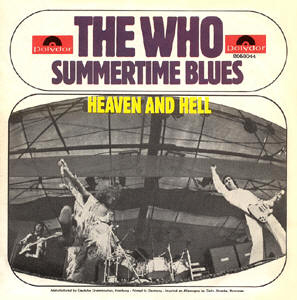
On the 10th, the single "Summertime Blues" backed with "Heaven and Hell" is released. The A-side comes from the album Live at Leeds while the B-side is a quickly recorded mono studio version of the Entwistle song done for the BBC with a new vocal slapped on. It reaches #38 in Britain and in the U.S. it makes #27 in the Billboard charts and #14 in the Cash Box charts.

Jazz & Pop carries an interview with Pete. He talks about how much he hated Woodstock and compares The Who to The Rolling Stones and Led Zeppelin.
On the 17th the BBC-2 religious program The Timeless Moment airs an interview with Pete filmed in late 1969 in which he discusses his belief in Meher Baba. Tommy cover artist Mike McInnerney and his wife Katie are also on the programme.
On the 18th, the soundtrack to Woodstock, featuring The Who's performance of "See Me Feel Me", hits the charts in Britain. It peaks at #35.
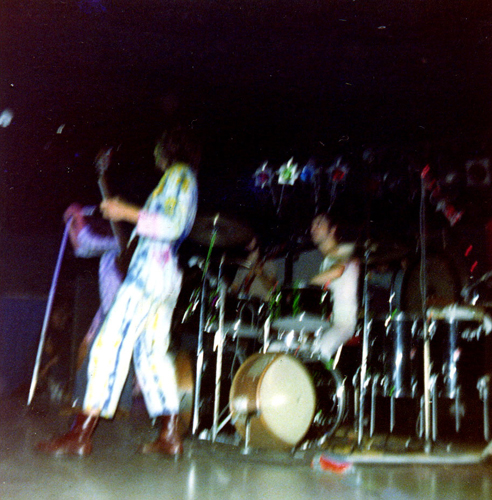
After all the U.S. touring, The Who do a one-off British show at the Civic Hall in Dunstable on the 25th. Pete wears a tie-dye version of his usually white boiler suit and destroys a Gibson SG at the end. The supporting acts were to have included Wishbone Ash but at Keith's insistence, they are replaced by Roger Ruskin-Spear and his Giant Kinetic Wardrobe.
August 1970
New music releases: "Paranoid" - Black Sabbath; Close To You - The Carpenters; Gold - Neil Diamond; Worldwide 50 Gold Award Hits Vol. 1 - Elvis Presley
On the 1st, Melody Maker reports on the concert promoter for the Yorkshire Jazz and Blues Festival who had been advertising The Who as his headliners on the 15th. Oddly, he didn't inform the band. The Who announce in this issue that they have no intention of appearing at the festival. In the same issue Chris Charlesworth reviews The Who's July 25th show saying they fully lived up to their slogan, "the world's most exciting stage act."
On the 4th, Nancy Lewis of The Who's U.S. management organization, accepts the Gold record award for Live At Leeds at the Decca Records Sales and Promotion Meeting in New York.
On the 8th, The Who play a one-off concert at The Belfry in Sutton Coldfield.

On the 15th, Melody Maker says "Make way for the Townshend brothers!" in an article about Pete recording his brothers Simon and Paul.

Around this time, Pete buys a large American van he dubs "Maxine" which he drives everywhere. The van's size, comfort and air-conditioning inspire Pete to imagine a heavily-polluted world where people travel and live in sealed vans. The idea sparks the song "Going Mobile" and becomes one of the ideas behind the Life House project.
Pete and Keith, along with Ronnie Lane on bass, form the one-off group "Tommy and the Bijoux" recording the backing track for the song "Warm Heart Pastry" for the LP Smiling Men with Bad Reputations by Mike Heron of The Incredible String Band.

On the 22nd, Melody Maker inaugurates "The Pete Townshend Page." In the first column, Pete discusses is vacation location and how great a guitarist he considers Joe Walsh of The James Gang.
On the 24th The Who are at the Civic Hall in Woverhampton. They are joined onstage by John Sebastian, late of The Lovin' Spoonful, who is a houseguest of the Townshends at the time.

The 28th sees another single from the Pete-produced Thunderclap Newman. "The Reason," with Pete on bass, is backed with a live recording "Stormy Petrol." It fails to chart.
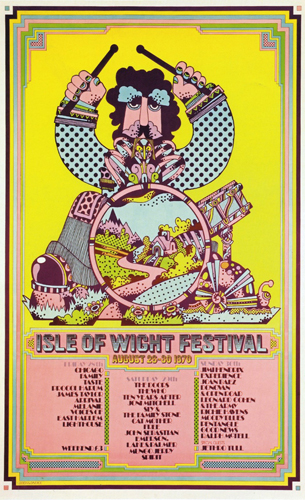

On the 29th, The Who make their second appearance at the Isle Of Wight Festival, with one of the greatest ever line-ups including what would be the last performances of Jim Morrison and Jimi Hendrix. The promoters envision it as a British version of Woodstock. However an attempt to raise money to pay for the festival by keeping out non-paying attendees with fences and guard dogs turns into chaos as 600,000 people, nine-tenths of them not paying, descend on the music event. The fences are soon trampled, fans from France and Germany get blamed and the anger of those who demand a "free festival" reaches all the way to the stage. Some performers are booed or interrupted by hecklers. Fortunately for the well-being of the hecklers, none of them interfere with The Who's performance that begins around 3am Sunday morning. The Who roar through a two-hour set featuring a live Tommy. John wears a specially made skeleton suit (so tight he is unable to sit down while wearing it). Pete takes two things with him from the festival; the image of fences being torn down that will appear in the songs "Let's See Action" and "Put The Money Down" and the question of the purpose of music festivals that will become a theme in Life House.
In a bad bit of concert scheduling, quiet folk music act Melanie ("Brand New Key") follows The Who. Keith Moon spends an hour talking to her to calm her down and get her ready to perform after hearing she is too nervous to take the stage. The Who's set is released on CD as The Who Live At The Isle Of Wight 1970 and as the film Listening To You: The Who at the Isle Of Wight, both in 1996. As for the Who themselves, they, minus John and Keith, will not appear at another Isle of Wight festival until 2004.
September 1970
New music releases: Abraxas - Santana; Paranoid - Black Sabbath; After The Gold Rush - Neil Young; "Wild World" - Cat Stevens

On the 4th, "Summertime Blues" peaks at #25 in the Netherland's Hilversum charts. On the 15th, the German charts will have it at #19.

On the 12th, Record Mirror reports that 1.3 million copies of Tommy have been sold in 8-track format.
Also on the 12th, The Who launch a tour of the Continent beginning at the Münsterland Halle in Muenster, West Germany. On the 13th, they are at the Oberrheinhalle in Offenbach. At the show Pete announces the title of The Who's soon-to-be-released album as "6 ft. Wide Garage, 7 ft. Wide Car." It's a reference to the use of Pete's garage studio Eel Pie for the recording of the songs. The album is never released.
On the 14th, U.S. Vice-President Spiro Agnew gives a speech to fellow Republicans at a fundraising dinner at The Sahara in Las Vegas. He denounces rock music for promoting drug use, singling out "With a Little Help From My Friends" and "The Acid Queen".
The Who stay in a hotel in Frankfurt where Pete picks up hotel stationary on which he writes the original draft of the song "Love Ain't For Keeping." He also writes "Pure and Easy" around this time, called "The Note" at this early stage.

The tour continues to The Netherlands with shows at De Doelen Halle in Rotterdam (16th) then a return engagement at the Concertgebouw in Amsterdam (17th) and finishes with two dates in Denmark, at the Falkoner Centret Teatret in Copenhagen (20th) and the Vejlby Risskov Hallen in Aarhus (21st).
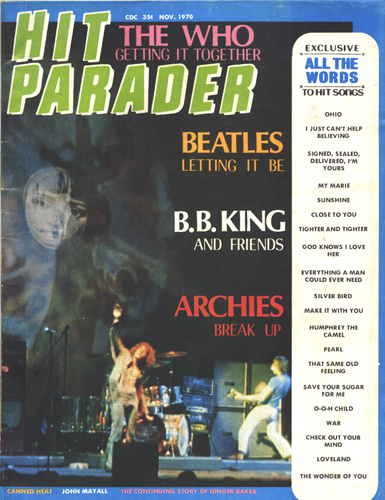
Hit Parader has an interview with Pete in which he calls "Dogs" and "Magic Bus" corny and says Tommy is overrated. The magazine also contains an article on The Who's roadies.
On the 19th, Melody Maker carries an article entitled "Doctor Who" about Keith sneaking into a hospital after hours to visit Who publicist Brian Sommerville. The issue also contains the 2nd "The Pete Townshend Page" called "Another fight in the playground." Pete discusses the negative coverage of the 1970 Isle of Wight festival and also the idea of the "Universal Chord" that will be at the center of the Life House plot.

Also on the 19th, Cash Box in the U.S. carries an ad from Decca Records offering a free Who poster to record dealers to encourage them to stock The Who's back catalog.

Meanwhile Keith and his friend Viv Stanshall drop by the Track Records offices to take promotional pictures for the release of Stanshall's new single "Suspicion" which features Keith on drums and John on bass. For no particular reason, they dress up as Nazis and stay in uniform for a week, visiting a German beer cellar in London then renting a German car and traveling through London's Jewish district with Keith seig heiling out the sunroof.
Later in the month Roger and his girlfriend Heather Taylor hold a party at their new country home in Burwash. Keith shows up in a Rolls Royce packed tight with children's toys.
On the 24th, Dick Fontaine premieres his film Double Pisces, Scorpio Rising at the Institute of Contemporary Arts in London. The soundtrack features Pete's demo of "I Don't Even Know Myself" as well as the otherwise unreleased instrumental "Piledriver." The film is part of a screening of movies by the Tattooist group that also includes Richard Stanley's music video for "The Seeker."

On the 26th, "See Me Feel Me" backed with "Overture From Tommy" hits the U.S. charts. The 16-month old A-side is released to cash in on the popularity of the movie Woodstock and becomes one of The Who's biggest U.S. hits reaching #12 in Billboard and #8 in Cash Box.
On the 28th, in Senior Scholastic magazine, Vic Rauseo argues that Tommy is not trying to replace opera but it simply a new musical form.
Starting on the 28th and ending on the 30th, Pete writes out the scenario for The Who's next project, the film Life House. "OVERTURE: The farmers — Life — Beauty — Celebration, LIFEHOUSE: The City — Rock — Youth against finance — Individuals working for the whole, GLORIFICATION: They disappear — they triumph, leaving everyone behind." He sends a copy to co-manager Chris Stamp along with details on how the members of The Who would fit into the movie and how filming might be handled.
October 1970
New music releases: "Your Song" - Elton John; Led Zeppelin III - Led Zeppelin; Tumbleweed Connection - Elton John; Taproot Manuscript - Neil Diamond
During the first week of the month, The Who are in rehearsals, breaking in a new lighting rig and stage design for their upcoming UK tour. During these rehearsals, Pete attempts to explain his plans for the Life House film to the other members. His explanation results primarily in confusion with John wondering if they would be allowed to go home or would have to live and perform round-the-clock during the filming. Roger, meanwhile, is confused by the intersection of the fictional script and the real-life concerts Pete is proposing. He inquires how they will get enough wire to put everyone in Britain into "experience suits", a remark that will inspire the name of their 2006 album, Endless Wire.

On the 2nd, the Pete-produced Thunderclap Newman LP Hollywood Dream is released. Despite a #1 hit single, the LP fails to chart in the U.K. In the U.S. it peaks at #161. It will be the group's only LP release.

On the 3rd, Melody Maker contains the article "Moon over Chipping Norton" about Keith's part-ownership of country inn The Crown & Cushion.
The 1970 U.K. tour begins on the 6th at the Sophia Gardens in Cardiff, Wales. Pete drives to the date, as he will for all the dates on the tour, in his gigantic American mobile home. After parking, he walks to the show with his boiler suit under his arm, as he puts it, "like a local Welsh lad made good." After two years, John's "Heaven and Hell" is dropped from the beginning of the shows to be replaced by "I Can't Explain." The opening act is The James Gang featuring Pete's friend Joe Walsh. Long time Who roadie/tour manager Mick Double logs his first night with the band on this date. Norrie Drummond from New Musical Express catches the show and dubs The Who "the most exciting group in Britain."
From there it is on to the Free Trade Hall in Manchester (7th), the Orchid Ballroom in Purley (8th) and the University of Sussex in Brighton (10th). For the last date, The Who are joined onstage by Pete's then houseguest John Sebastian who helps them sing "Magic Bus." Michael Watts in Melody Maker reviews this show and has to admit that after a year and a half "Tommy really is getting a bit thin."

On the 9th, Track records releases "See Me Feel Me" backed with "Overture From Tommy" in Britain. Derek Johnson in New Musical Express says, "I've tipped it for a hit because it deserves to be one, but so many fans now own the LP, that this extract must be expected to miss out on a lot of sales." He is correct as the single fails to chart in the U.K. although its release by Polydor in the Netherlands, reaching #2 in their charts
Billboard reports that Decca Records' "Who Month" promotion has been a huge success with retail sales of Who records "far above" $4 million dollars. Decca's vice president of marketing and creative services Tony Martell calls it "unparalleled in Decca's history."

For further promotion, Decca releases a second single from Live at Leeds,
On the 10th, the New York Film Festival begins running through the 20th. Dick Fontaine's film Double Pisces has its U.S. premiere here.
On the 11th, at the Odeon Theatre in Birmingham, Pete introduces the audience to one of the co-authors of "Dogs, Part Two" and brings his dog Towser on stage.

Who clothing and pieces of equipment are included in one of the first Rock collectibles auction at The Fillmore East on the 12th. The items include a pair of broken drumsticks, a shard of one of Pete's guitars, Roger's suede fringe jacket from the Isle Of Wight concert and a disposable lighter Keith had thrown away. The auction is run by Bill Graham to raise money for peace candidates in the American mid-term elections.
The next show is a return to Leeds, this time to play the Locarno Ballroom on the 13th. Roger causes the postponement of the next two shows after he comes down with bronchitis.

Sometime during this month Roger also finds time to marry for the second time. His new wife is the American model Heather Taylor. He later says they agreed to the marriage even after he explained that when he was on the road he "wouldn't be the Pope." To date, they are still married.

On the 17th, the 3rd "Pete Townshend Page" appears in Melody Maker. In "On the road again" Pete gives his impressions of life on tour.
The tour resumes at the Odeon Cinema in Lewisham on the 18th, followed by the ABC Cinema in Stockton-on-Tees (22nd), Green's Playhouse in Glasgow (23rd), Sheffield University (24th), the Empire Theatre in Liverpool (25th), Trentham Gardens in Stoke-on-Trent (26th), the University of East Anglia in Norwich (27th) and ends at the Hammersmith Palais in London (29th). Pete smashes his Gibson SG at the Hammersmith show and the crowd fights over the pieces.
In Rolling Stone, Pete denies that he and Thunderclap Newman's John "Speedy" Keene are the same person.

On the 24th, Pete is interviewed in Disc & Music Echo, an interview that holds much the same place for Life House that Pete's mid-1968 Rolling Stone article held for Tommy, a early statement of intent. This is his plot for the proposed "film-album": "It’s about a set of musicians, a group, who look like the Who, and behave remarkably like the Who, and they have a roadie who is desperately interested in ideals for humanity. It’s basically a science fiction fantasy idea. This roadie is wrapped up in electronics and synthesizers. He’s fanatically serious about finding ‘The Note’ and spends all his time converting Egyptian charts and musical mysticisms into electronic circuitry – and discovers all these wonderful and weird oscillations. He’s fantastically serious, but the group isn’t. Anyway, this group find a note which, basically, creates complete devastation. And when everything is destroyed, only the real note, the true note that they have been looking for, is left. Of course, there is no one left to hear it; except the audience, of course, who are in a rather privileged position." Pete plans to create this work in a studio/concert hall he wants to construct based on Creedence Clearwater Revival's Factory. In other news, Pete says Universal has lost the rights for a Tommy movie to Warner Bros.

Meher Baba makes the cover of the Rolling Stone (issue Nov. 26) as Pete pens the cover story explaining his devotion to the avatar.
In Creem, Pete says that the film of Tommy has been put on hold as he has plans for another Who film. On the 31st comes a Melody Maker article, "Who's cheap singles plan dampened." In it, record executives call Pete's plan for marketing cheap maxi-singles unfeasible. The format is popular in budget-conscious Britain but is unknown in America. Ultimately the maxi-single is cancelled after U.S. Decca refuses to release it.
November 1970
New music releases: All Things Must Pass - George Harrison; Greatest Hits - Sly & The Family Stone; "My Sweet Lord" - George Harrison; Tea for the Tillerman - Cat Stevens

On the 3rd, The Who are photographed by David Montgomery at his Edith Grove, Chelsea studio. The photos are extensively employed as publicity and are later used for the U.S. cover of Who's Better Who's Best and the U.K. cover of The Definitive Collection.

On the 6th more £1-each Backtrack LP's are released in the U.K. Backtrack 8 is a reissue of A Quick One (mono), Backtrack 9 is The Who Sell Out and Backtrack 14: The Ox is a collection of Who songs all written by John Entwistle.

Also on this date the poor-selling "See Me Feel Me" single on Track is withdrawn and replaced by a Tommy EP. Those who had already bought the single were allowed to exchange it for the EP at the Track Records office. Despite all the deals, the EP also does not make the charts.

On the 7th are several Who articles. In Melody Maker, Chris Charlesworth pens "I See A Mad Moon Rising," in which he recounts Keith's antics before and after the October 29th Hammersmith Palais concert. In another article, Charlesworth interviews Bob Pridden. And in New Musical Express is part one of a large interview with Pete conducted by Richard Green. The interview concludes on the 14th.
On the 8th, Keith sits in on congas at an East Of Eden gig at the Lyceum, London, then on the 12th achieves a lifelong dream when he jams onstage with The Beach Boys at the Winter Gardens, Bournemouth, after being recruited on the train journey enroute.
In Rolling Stone (issue Dec. 10), Jon Landau prints a long State-Of-Rock article and puts The Who to bed: "The Who were one of the truly inspired groups of the mid-Sixties. After expending so much energy just getting known in this country, they have finally reduced what was once a blazingly exciting concept into their own set of rules and formulas. Tommy was made the Who a permanent institution, and wonderfully so. Unfortunately, it seems that their most innovative days are behind them."

On the 13th, another single is pulled from the Thunderclap Newman album, "Wild Country" backed with "Hollywood Dream" and released in the U.K. Pete produces the single and plays bass on it with the addition of pedal steel on the b-side. It fails to chart.

On the 14th, Melody Maker carries the fourth installment of "The Pete Townshend Page." This one is called "TV miming: who is being fooled?" In it Pete complains about the too-tight TV restrictions of the British Musician's Union and he also discusses Top Of The Pops and memories of Ready, Steady, GO! Accompanying the article are pictures of Pete wearing a hobo outfit and holding a Musician's Union card.
Track Records' Mike Shaw notes in his diary that on the 15th, The Who held a rehearsal at the Young Vic theatre. This may have been the date of The Who's first try at the real-life part of Pete's Life House idea. No other dates have been found to date of other Young Vic appearances during 1970.
The Who play a few dates throughout the month in the U.K. On the 21st The Who return to Leeds University. Desperate for new material and trying not to supply the same show they recorded there in February, The Who cut more songs out of Tommy and replace them with covers of "Daddy Rolling Stone," "Cinnamon Girl" and "All Right Now."
On the 26th, The Who fail to play the Fillmore North in Newcastle after Roger gets fogged in on the motorway. Pete, John and Keith announce the postponement from the stage. The prog rock band Curved Air is substituted. The Who finish the month at Lanchester Polytechnic in Coventry. They plan to leave on a high note but after cutting down Tommy and losing "Summertime Blues" and "Shakin' All Over" they realize they've only played 45 minutes! Pete later declares the show a "disaster."
On the 30th, John begins recording the first Who solo album, Smash Your Head Against The Wall at Trident Studios. Recording will continue for the next two weeks with Keith dropping by to play bongos on "Number 29 (Big Chicken)" and to sing "Rudolph the Red-Nosed Reindeer" for the fade-out to "I Believe In Everything."
December 1970
New music releases: Pendulum - Creedence Clearwater Revival; Rose Garden - Lynn Anderson; "I Really Don't Want to Know" - Elvis Presley; Love Story (Original Soundtrack) - Frances Lai
On the 1st Kit Lambert pulls the band into IBC Studios to re-record "Water" and "I Don't Even Know Myself" for the never-to-be-released maxi-single. The two recordings are not released until they appear on the Who's Next / Life House release in 2023.
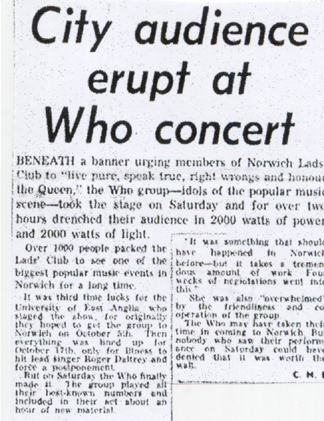
On the 5th, The Who play a makeup date at the University of East Anglia in Norwich. They perform almost an hour of new material under a banner for the Norwich Lads Club reading "live pure, speak true, right wrongs and honour the Queen."

The same day, Billboard reports that Atlantic Records is shipping a one-sided promotional album to U.S. radio stations with Pete talking to the members of Thunderclap Newman and playing tracks from their album Hollywood Dream.

On the 11th, Viv Stanshall releases his solo single "Suspicion," credited to Vivian Stanshall & Gargantuan Chums. It is produced by Keith with Moon on drums and John on brass and bass. It is sent out by Track Records offshoot Fly. It fails to make the charts.
Amongst all the writing and planning for the forthcoming Life House movie, Pete does manage to pen a fifth contribution to "The Pete Townshend Page" in Melody Maker on the 12th. Called "Is rock dead?" Pete declares it isn't true due to the influx of new bands and musical technologies.

Also on the 12th, Billboard reports that "See Me Feel Me" has reached #3 in the Netherlands.

The issue of Disc & Music Echo of the 14th features Keith Moon on the cover dressed as Scrooge from Charles Dickens' A Christmas Carol.
Pete is employed by the Rolling Stones who bring him, Ronnie Lane and Billy Nicholls in to Olympic Studios to provide backing vocals to the song "Sway" for the Stones' forthcoming album Sticky Fingers.
During the month, Chris Stamp and Mike Shaw bring their old pal Bill Curbishley in to work at the Track Records office. Within a few years Curbishley will replace Chris Stamp as Who manager, a position he holds to this day.
The 15th sees the first of three more concerts this month by The Who. That night they are at the Fillmore North (the Mayfair Ballroom) in Newcastle. In addition to their regular songs The Who play "Daddy Rolling Stone" and Free's "All Right Now" and after the show, Pete wanders out into the audience and gets into a fight! The 16th sees a less interactive show at the Futurist Theatre in Scarborough.

On the 19th, Billboard runs an article on The Who's upcoming movie projects. They say that Tommy will eventually be made into a movie but that for now, Pete is proceeding on a film with the working titles "Your Turn In The Barrel" and "Barrel One, Barrel Two." These titles actually refer to a document Pete prepared for The Who's managers explaining that the resulting film would have a fictional script (one barrel) while also developing stories from real life coming from people attending a series of public Who concerts staged for this purpose (another barrel). New Musical Express also says The Who will make two films in 1971, one of which will be Tommy.

On the same date, Record Mirror reports that The Who's maxi-single will be released early in 1971. The tracks will be "Water," "I Don't Even Know Myself," "Naked Eye," and "Postcard."
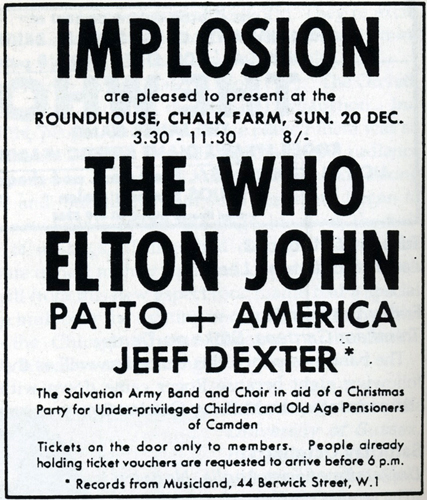
On the 20th, The Who's 1969-1970 performances of a near-complete Tommy finally come to an end with a performance at the Roundhouse in London. They will not play it again at close to its full length until 1989. The show is dedicated to one of their opening acts, Elton John, and proceeds go to funding a Christmas party for poor children and old people living in Camden. The other opening acts are Jeff Dexter, America and Patto.
Around the same time, after an all-night drinking party at the pub Keith owns, The Crown and Cushion, his friends try to carry him upstairs to his bed and accidentally drop him down the stairs, breaking his collarbone.

On the 30th, The Who appear on BBC1's Top Of The Pops Into '71 programme set to air on New Year's Eve. Pete wears a Cockney "Pearly King" outfit while Roger apparently wears the cover off the family room sofa. Keith plays his new transparent drum kit, or rather he appears to play. In fact his right wrist is tied to a cord, the other end of which is held by Keith's friend Viv Stanshall. Whenever Viv sees the camera's red eye go in Keith's direction, he pulls on the cord, jerking Keith's arm and making it appear the injured drummer is actually performing. The Who mime to two as-of-then-unreleased songs, "I Don't Even Know Myself" (in its rare "N-word" version) and "Naked Eye."